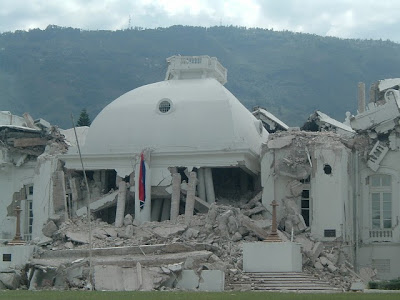
(Photo by Frandy DeJean)
This is Haiti's National Palace shortly after the earthquake. Directly in front of the crumbled National Palace is a tent city in Champ de Mars with 20,000 people. They are living in horrid conditions and the mayor of Port-au-Prince wants the tent city cleared of people, tents, and garbage.
This scenario in Haiti's capital reminds me of Washington DC four decades ago.
In May of 1968, one month after Martin Luther King, Jr. had been assassinated, the Poor People’s Army converged on Washington DC. They camped out on the Mall and the encampment was called Resurrection City.
More than two thousand people of all colors and backgrounds came from different parts of the United States.
Ralph Abernathy, Jesse Jackson, and Andrew Young were in charge.
This city was meant to be a deliberate eye sore to force the US government to pay attention to the problem of systemic poverty. Some of the objectives of the Poor People’s Army was to end hunger in America and to rebuild the nation’s worst inner-city ghettos.
However, by the second week, things in Resurrection City began to unravel. The leaders started to bicker. Teenage gang members harassed and beat up reporters. The rains came for two weeks leaving people living in brown slush. Worried health department officials warned that outbreaks of dysentery and typhoid may occur.
And the Poor People’s Army had run out of steam and cash.
Ramsey Clark, perhaps alone among high-ranking Lyndon Johnson administration officials, responded to the problems in the Mall:
“Lincoln smiled kindly, but the American people saw too much of the truth. For poverty is miserable. It is ugly, disorganized, rowdy, sick, uneducated, violent, afflicted with crime. Poverty demeans human dignity. The demanding tone, the inarticulateness, the implied violence deeply offended us. We didn’t want to see it on our sacred monumental grounds. We wanted it out of sight and out of mind.”
Sounds like Port-au-Prince today.
See the article below.
By TRENTON DANIEL
Miami Herald, August 10, 2011
http://www.miamiherald.com/2011/08/10/2353828/haiti-mayor-says-he-plans-to-clear.html
PORT-AU-PRINCE, Haiti -- Thousands of Haitians living in one of the biggest tent camps created after last year's earthquake could soon have a new home: the mountains north of Port-au-Prince.
City officials plan to relocate the almost 20,000 people living on the 42-acre (17-hectare) Champs de Mars plaza across the street from the crumbled National Palace if the central government approves, Port-au-Prince Mayor Jean Yves Jason said Wednesday. Patrick Rouzier, a housing and reconstruction adviser for the government, acknowledged the plan in a text message. He said Jason wants to move the families to Morne Cabrit, a mountain north of the capital, and house them in temporary shelters.
The government has reservations about the approach, Rouzier added, but he did not elaborate. He said he was traveling with President Michel Martelly.
Jason cited an "act of banditry" in the public square as a reason for officials wanting to clear away the camp, which has become a shantytown complete with barber shops, boutiques and restaurants and is a symbol of Haiti's post-quake misery. "We are going to respond next week," Jason told The Associated Press.
About 20 students have been burning tires at the plaza in recent days in a call for justice after a fellow student was shot and wounded during a robbery for his laptop computer. Jason said officials are figuring out a plan to compensate the camp residents but didn't answer questions asking how much they would get.
The planned closure comes as Haitian authorities have been criticized for not doing enough to provide housing as they try to move the homeless out of public and private spaces. Last week, about 60 to 80 demonstrators shut down traffic on a busy thoroughfare to protest efforts to relocate them from a private lot. They said the $125 that authorities offered to families was insufficient to secure housing.
Martelly said last month that he opposes forced removals.
More than 630,000 people still don't have shelter 19 months after the January 2010 quake, the International Organization for Migration says. The relief group released a report last week saying that 94 percent of camp residents would leave if they had alternative housing. Most of those surveyed said they wouldn't be able to pay for rent or house repairs if they had to leave immediately.
The Martelly administration wants to close camps in six public places and move the residents into 16 redeveloped neighborhoods, a project the international community supports. The World Bank-run Haitian Reconstruction Fund agreed last month to set aside $30 million for the project pending the submission of a complete proposal.

No comments:
Post a Comment